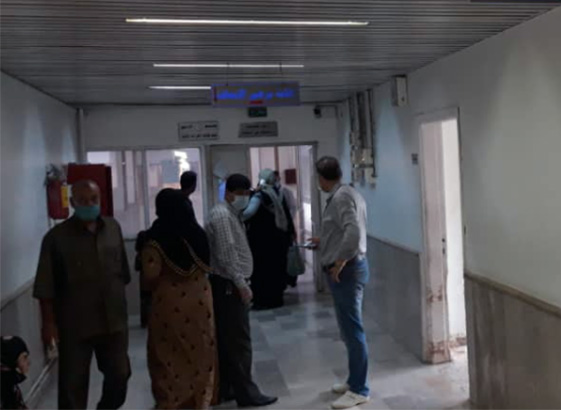 9 February, Damascus, Syria – WHO Syria and the Government of Japan sealed a strategic agreement to rehabilitate and renovate the Al-Qamishli National Hospital in Al-Hassakeh Governorate of Syria. By signing the agreement, the Government of Japan has demonstrated its continuous commitment to reviving the Syrian health system fatigued by the decade-long crisis.
9 February, Damascus, Syria – WHO Syria and the Government of Japan sealed a strategic agreement to rehabilitate and renovate the Al-Qamishli National Hospital in Al-Hassakeh Governorate of Syria. By signing the agreement, the Government of Japan has demonstrated its continuous commitment to reviving the Syrian health system fatigued by the decade-long crisis.
The generous US$ 6 million grant will assist in renewing the 40-year-old infrastructure of the hospital, while revamping secondary health care services at a hospital that serves as the main referral centre for many areas in north-east Syria. Once the hospital is renovated, health workers and doctors with different specialties will have an opportunity to regain their profession and help people in need of health services.
Al-Hassakeh governorate serves as the base for most of WHO’s humanitarian health operations in the north-east. Some of Syria’s major camps for internally displaced persons (IDP) are located in this governorate. The Al-Qamishli National Hospital, built in 1982, was once renovated in 2005. However, the hospital with just the 200-bed capacity and overburdened since the crisis in Syria started, requires major rehabilitation. Currently, it is the only functional hospital in the Region, yet it struggles with outdated infrastructure and equipment.
Though the hospital is in a pressing urgent need of overall maintenance as well as replacement of its outdated medical equipment, WHO, with support from the people of Japan, will prioritize the vital functions such as the burns unit, intensive care unit, emergency, dialysis, magnetic resonance imaging, and isolation sections.
Furthermore, modern medical equipment will be procured to meet the needs of all the departments in the hospital.
Japan’s support will cover the critical gaps to avoid further deterioration of health services, as well as strengthening the country’s capacity to respond to public health emergencies due to major outbreaks.
WHO’s response strategy revolves around expanding the availability of health care services, as well as delivering medicines and supplies to hospitals to help them manage the influx of patients. Once renovated, the hospital will serve the needs of 1.6 million people, including 600 000 IDPs in the 3 northeastern governorates of Al-Hasakeh, Ar-Raqqa and Deir-Ez-Zor.
“WHO continues to contribute to the regional vision of Health for All by All and to make sure that no one is left behind,” said Dr Akjemal Magtymova, WHO Representative in Syria. “We are very grateful for the generous contribution of the Government of Japan which will play a crucial role in addressing the shortage of life-saving health services that have been exacerbated by the COVID-19 pandemic and the Syrian war,” Dr Akjemal noted.
“Japan stays engaged in humanitarian assistance to support children, youth and women wherever they are in Syria to meet their urgent needs,” said Mr Akira Endo, Special Coordinator for Syria and Charge d'Affaires of the Embassy of Japan in Syria. “The humanitarian crisis in Syria has become more complicated, especially as a result of the impact of COVID-19, which has negatively affected the health and living conditions of thousands of households. We sincerely hope that our contribution will find its way to people in need of assistance and alleviate the suffering of as many Syrian people as possible.”


